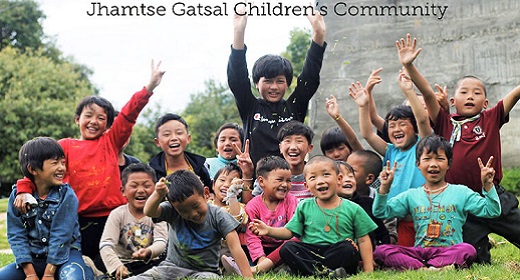by Megan Larson:“We all have within us the seeds of compassion to heal ourselves and the world around us. With right nurturance and right environment, these seeds will take root and flourish within us.” – Lobsang Phuntsok
In the United States, mental health disorders among children are being diagnosed at younger and younger ages, and increasing in frequency. A mental health disorder is described as “a serious change in the way children typically learn, behave, or handle their emotions, causing distress and problems getting through the day.” Many mental health disorders are linked to trauma, as this impacts the brain with adverse effects on the childs development.
Children in America spend an average of 1,000 waking hours at school each year. Imagine what could happen to the wellbeing of those children struggling with mental disorders if they were taught to tend to their internal world through mindfulness and meditation? What if loving kindness to self, other, and the entire humanity, was taught? How would this impact our world and the mental health of our youth? What if children were taught how to heal from their trauma and discover their peace? At a school called Jhamtse Gatsal, located in Lumla, in mountainous northeastern India, they are doing just that and having incredible, inspiring results. I had the great fortune of having a dialogue with the visionary founder, Lobsang Phuntsok, to find answers to these questions.
Jhamtse Gatsal, which is Tibetan for the garden of love and compassion, is a home and learning community for 107 orphaned, abandoned and at-risk children aged between toddlers to young adults. The children come from diverse backgrounds full of adversity, trauma and poverty. They belong to the Monpa tribe of Arunachal Pradesh in northeast India, which has its socio-cultural roots in Tibet. It has been operating for 15 years.
In my conversation with Lobsang, I was struck by his loving presence and humility in the way he spoke about his own experiences and his community. Trained as a Buddhist monk, Lobsang embodies the Dharma, a gift he is able to share with others. He left the monastery to dedicate his life to children and help them thrive. The quote by Khalil Gibran immediately came into my mind “I slept and I dreamed that life is all joy. I woke and I saw that life is all service. I served and I saw that service is joy.”
One might wonder what is their secret for happiness? We know that traumatic experiences in childhood can diminish concentration, memory, and the organizational and language abilities children need to succeed in school. Trauma can cause the brain to remain in a state of hyper-vigilance, suppressing memory and impulse control and trapping individuals in a state of strong emotional reactivity. We also know that meditation, the foundation of the Jhamtse Gatsal school, can change the structure of the brain. Recent neuroscientific findings show that meditation can literally rewire brain circuits that boost both mind and body health, as the brain can be deeply transformed through experience – a quality known as “neuroplasticity. Jhamtse Gatsal students meditate for an hour each morning and a half hour in the evening.
I asked Lobsang how are the children able to thrive despite such challenging backgrounds? Lobsang spoke about how “An unhappy student cannot learn, just as an unhappy teacher cannot teach. The happiness and the mental health wellbeing of a child is so important. In the same way, during the pandemic, I saw many companies and corporations giving mindfulness training on empathy and compassion. We see more interest in recognizing that developing happiness of the employee matters, directly impacting their work. So when someone comes from a lot of trauma and we initially try to teach them math or science, it does not work.”
Lobsang continued to share his belief that school has to play a true role in helping young minds to respond better. “It takes a lot of unlearning to teach happiness. Our state of mind is a result of our perception, how we interpret each situation. This is the logic we teach. Can we control a situation? Or can we control our perception of the situation? We cannot control the situation, yet we can control our mind and how we relate to it. I think school has to play a key role in the mental wellbeing of children.”
He also explained how trauma can cloud one’s ability to be present, as we can be stuck in reliving past experiences. Mindfulness allows us to arrive in the here and now. “Teaching the ability to understand their situation from a different perspective is very healing. There is the importance to get up each day, say something positive, then do something positive. This may not have a direct impact on anyone around you, but you are the one who is going to experience physical and mental level changes.” He continued to say, “ We teach the children to go beyond their trauma and suffering and use the suffering as a resource to understand others. Once they see another’s suffering, their challenges, they can have a direct experience of what it’s like to be them, to be abandoned, or to not get something that you badly want. This helps them to connect.”
A leading expert, Bessel Van Der Kolk, states in his book, “The Body Keeps the Score,” that traumatized individuals heal in the context of relationships. Lobsang spoke about how important relationship is in providing an environment in which children can grow and learn. At the school children live in one of four “family houses.” Each family is named after a Himalayan medicinal flower, a symbol of healing and wholeness. The Amala, at the heart of each family, has the primary responsibility to nurture the children as her own and give them the emotional stability they need. This ensures the children always know someone loves them and is looking out for them.
Normal issues most schools face, such as bullying, does not happen at Jhamtse Gatsal. Through mindfulness practice, implemented in their everyday life, the children are able to see the benefit for themselves directly of how it feels to contribute positively to their community. “The power of being kind, thinking kind and doing something positive is profound”.
Meditation is called “Me-Dating” as a way to make it more accessible for the younger children. “Me-Dating” is a date with one’s self. “This person is going to be with you for the rest of your life. Just one me-date everyday shows you the best version of yourself”. This allows the children to get in a habit of connecting with themselves with kindness, care and attention. Lobsang talked about the importance of “disconnecting to connect”. As a result of implementing these practices, children are then able to gain confidence in themselves, and find their unique place in the world.After my interview with Lobsang, I had some time to reflect on our conversation. There was so much that I took away personally to integrate into my work with children that I wanted to convey in this article. On some level it is difficult to put into words the feeling that you get when you interface people that truly lead with heart. The joy that they exude is contagious and you cannot help but feel inspired. All my interactions with the team at Jhamtse Gatsal were just that, full of individuals who radiate joyful presence. I’ve heard many wise teachers over the years say that the cause of our sufferings is the singular focus on these three words, “I, me, mine”. The attention to others, and the act of generosity in service, may just be the magic ingredients why this feels to be the happiest school in the world.
“All the joy the world contains has come through wishing happiness for others. All the misery the world contains has come through wanting pleasure for oneself.”- H.H. Dalai Lama
To find out more information about Jhamtse Gatsal’s visit : https://jhamtseinternational.org
 About the author: Megan Larson MSW, LCSW is a psychotherapist, parent coach and mindfulness guide with therapy offices in Colorado & California. She provides parent-coaching & support to clients across the country. Her clinical work is influenced by current research on play therapy, neurobiology, and the mind body connection. As a yoga & meditation teacher, her approach stems from Eastern traditions, specifically Tibetan Buddhism. She is featured in the book The Unexpected Power Of Mindfulness & Meditation along side visionary leaders such as Ed & Deb Shapiro & Byron Katie.
About the author: Megan Larson MSW, LCSW is a psychotherapist, parent coach and mindfulness guide with therapy offices in Colorado & California. She provides parent-coaching & support to clients across the country. Her clinical work is influenced by current research on play therapy, neurobiology, and the mind body connection. As a yoga & meditation teacher, her approach stems from Eastern traditions, specifically Tibetan Buddhism. She is featured in the book The Unexpected Power Of Mindfulness & Meditation along side visionary leaders such as Ed & Deb Shapiro & Byron Katie.
Web site: avibrantmindllc.com









































